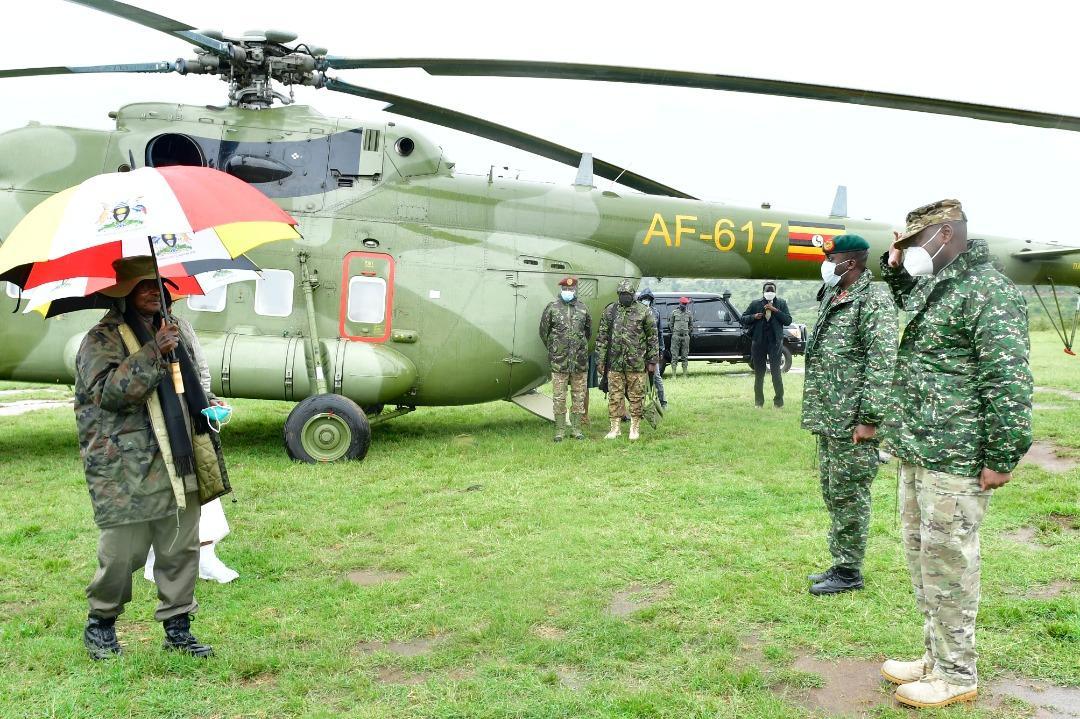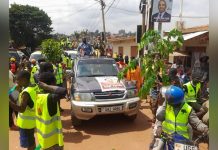Faridah N Kulumba
Africa-Press – Uganda. The President of Uganda Yoweri Kaguta Museveni announced last weekend that Uganda’s military helicopters launched an attack on a camp of the Allied Democratic Forces (ADF) rebels, located 60 km from the border between Uganda and the Democratic Republic of the Congo (DRC) that hosts hundreds of Ugandan troops deploying under a separate bilateral arrangement to help hunt down the IS group.
Through his social media account X, President Museveni also commander in chief of the Uganda armed forces described the attack as a devastating one because it was a clear target, and the reconnaissance plane was monitoring from the air.
Vengeance
The airstrike happened less than a week after suspected ADF rebels attacked a safari vehicle, resulting in the deaths of two tourists and their guide in a national park area in western Uganda.
Before the attack on tourists, ADF terrorists also attacked a cargo truck that was transporting onions, killed one civilian, and set ablaze the vehicle.
President Museveni said that the group of five people responsible for burning the lorry, the tourist van, and the killing of the two tourists with their driver is being pursued.
In a previous statement, Museveni had prophesied that ADF rebels might attempt to infiltrate the border to enter Uganda due to the mounting pressure they were facing from the joint forces of Ugandan and DR Congo soldiers.
British tourist terror
This month a British tourist and his new South African wife were shot dead in an “ambush” at a Ugandan safari park while on their honeymoon.
According to the statement that was issued by the Uganda police, the two foreign holidaymakers were touring the Queen Elizabeth National Park in the southwest of the country with their local guide when the trio were gunned down in a “cowardly” attack by the terrorist. Ugandan police blamed the attack on the ADF
Joint operation
In November 2021, Uganda and DR Congo launched a joint operation against the ADF, an armed group allied with Islamic State.
The ADF has been based in the jungles of eastern Congo for more than two decades from where they launch attacks both within DR Congo and sometimes across the border in Uganda.
UPDF’s recent strikes on ADF
In September this year, the UPDF operating in the DR Congo killed more than 560 members of the ADF a group allied with Islamic State militants.
In August, the UPDF killed one of the commanders of an Islamic State (IS)-allied rebel group in the DR Congo. According to the military statement that was issued, the militia commander who was identified by only one name, Fazul, was a Tanzanian national who had been operating mostly in Mwalika valley in eastern Congo’s North Kivu province.
Ugandan head of state revealed that since the joint operation, Shujaa was launched by the two neighbouring countries 567 ADF rebels have been killed.
According to President Museveni, ’’fifty terrorists were captured alive, and 32 surrendered’’, he said. Several ammunition depots were recovered. The submachine guns and rocket-propelled grenades were among 167 pieces of equipment retrieved from the rebels.
About the ADF group
ADF, which was originally a Uganda-based rebel group, launched its attacks in the 1990s in the west by a Ugandan Jamil Mukulu whose adherents were Ugandan disgruntled with the government’s treatment of Muslims.
Mukulu, together with some Ugandan Muslims, said they were sidelined by the President of Uganda Yoweri Kaguta Museveni’s policies.
The rebel group was soon routed by the Ugandan military which drove its fighters across the border into Congo where they had been based and where its fighters had been attacking villages and torching schools in the early 2000s.
The remnants fled across the border, to the east of the Democratic Republic of Congo. Mukulu founded the ADF with the intention of returning to Uganda to establish an Islamic government.
In 2015 Mukulu was arrested in Tanzania, which neighbours both DR Congo and Uganda, and was extradited to Uganda where he is on trial. After his arrest, the ADF transformed into a group with a more global outlook when Musa Baluku, a Ugandan in his mid-40s, inherited the leadership.
According to a report from the George Washington University’s Program on Extremism Baluku wanted to position the ADF as part of a broader global movement.
Initially, ADF rebels worked with local communities to set up businesses, which made them popular with many around the town of Beni, according to a 2011 UN report.
But that changed when they started attacking local Christian communities.
Security gaps
Even though the Ugandan government says it has succeeded in killing more than 560 fighters and destroying their camps, President Museveni acknowledged “gaps” in how the security services had dealt with “remnants” of the group that continue to pose a threat.
He also advised the UPDF to work with the police and also involve the local people to hunt for these groups running from DR Congo. Adding that they are no longer a problem but they are police popular vigilance and ant-terrorism efforts.
For More News And Analysis About Uganda Follow Africa-Press






